Current as of: February 26, 2026 - 16:35
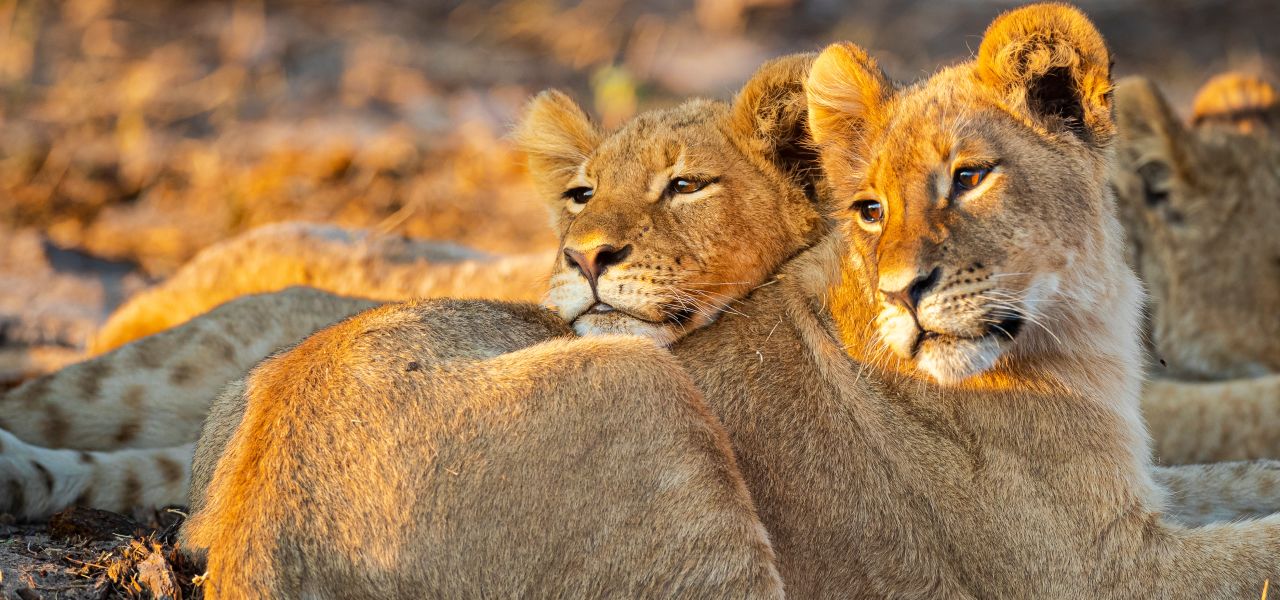
Botswana & Zimbabwe Lodge Safari Trip Notes
- Ways to Travel: Guided Group
- Destination: Botswana, Zimbabwe
- Programmes: Wildlife
-
Activity Level:
2 out of 7 - Easy & Moderate
- 14 Days: Land Only
- Ages: 16+
- Trip Code: WZA
- Carbon Footprint: 20kg CO2e
Trip Overview
Explore the best of Botswana and Zimbabwe on a two-week safari adventure
From the crashing Victoria Falls to the meandering Okavango Delta, this safari visits the best destinations in Zimbabwe and Botswana. Encounter the huge elephant herds of Chobe, search for rhinos and leopards in Matopos and spot wild dogs in Hwange. Starry skies and burnished sunsets complete the adventure.
At a Glance
- Accommodation: 11 Classic nights (hotels/lodges), 2 Simple nights (wild camping)
- Travel by minibus, 4×4 safari vehicles and mokoro canoes
- Group normally 4 to 12, plus leader. Minimum age: 16
Is This Trip for You?
This trip is graded Activity Level 2 (Easy & Moderate) and has a Wildlife Rating of Four. For more information on our trip gradings please visit the Activity Level Guidelines page or our Wildlife Holidays page for more on our Wildlife Ratings. If you have any queries about the difficulty of the trip please do not hesitate to contact us.
Drives: This two-week safari covers a lot of ground but connects some of the best places in Botswana and Zimbabwe. It does mean, however, there are some long drives on a combination of paved and dirt roads, though you never know when you may spot wildlife, even outside the parks. The longer drives between the sites are done in a more comfortable minibus while the game drives are done in special safari vehicles.
Accommodation: This is a safari for people who want to see wildlife and get immersed in nature but do it in more comfort. While not luxury, accommodation is in lodges apart from the two nights in the Okavango Delta, which are in our wild campsite.
Weather: October and November are hotter months but are also good for wildlife viewing.
Legal note: All group members joining this tour will be asked to sign an indemnity form at the start of the trip. This indemnity form is a requirement of the South African Tourism Service Association, of which our local supplier is a member. As a client of Exodus Travels Ltd, your rights under the Package Travel Regulations (1992) are unaffected, and Exodus remains liable for the actions of our sub-contractors.
Water safety: This trip includes time by a lake, river or sea, where there may be opportunities to swim. You should always seek local advice before deciding whether to swim. Open-water or wild swim spots should be treated with extreme caution. Information on how to keep yourself safe while swimming is shown here.
Adult min age: 16
Min group size: 4
Max group size: 12
Itinerary
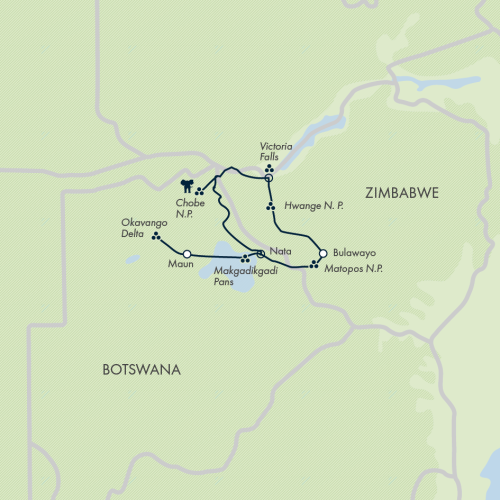
Land Only
- Start City: Victoria Falls
- End City: Victoria Falls
Land Only Itinerary
The adventure begins at Victoria Falls, home to one of the largest waterfalls in the world. Meet the group either at the airport or at the Rainbow Hotel in Victoria Falls town (see the Joining Instructions for more information). We then transfer 75mi (120km) to Kasane, Botswana. The drive takes a little over two hours but there can be delays crossing the border.
Around 6pm, say hello to your tour leader and fellow travellers where we gather as a group to get to know each other and learn more about the adventures ahead.
Your tour leader then ensures a big welcome over a group dinner together.
Want to explore further? Secure pre-tour nights through your sales representative.
Accommodation: Kwalape Lodge (or similar)
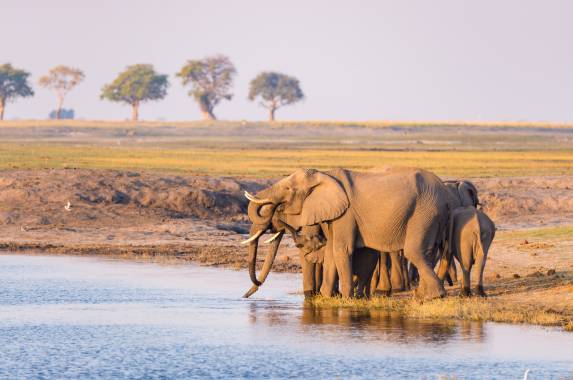
Chobe National Park is best known for its huge populations of elephants and buffalos. With an estimated 40,000 to 60,000 elephants this is, undoubtedly, the best place to see them in the world. The park is also home to wild dogs, lions, leopards and various other wildlife.
We start the day by going on a game drive in one of the lodge’s open game-drive vehicles. It will be an early start as we aim to get to the park gates as they open. We spend about three hours on safari before returning to the lodge in time for brunch.
There is time to relax at the lodge during the hottest part of the day or explore Kasane town (where we can get local currency) before heading out again, this time on a boat on the Chobe River. After a short transfer to the jetty, we board the boat for a three-hour safari. This is a great opportunity to view the vast herds of elephants and other wildlife from the water.
Accommodation: Kwalape Lodge (or similar)
Today is a long drive as we transfer the 375mi (600km) between Kasane and Maun, the town on the edge of the Okavango Delta. We’ll stop en route for lunch at the edge of the Makgadikgadi Pan before arriving in Maun mid-afternoon. We spend time in town getting supplies (this is a chance for you to get any extra drinks or snacks you may want while in the delta). From here, it’s only a short drive out of town to our lodge.
Accommodation: Crocodile Camp (or similar)
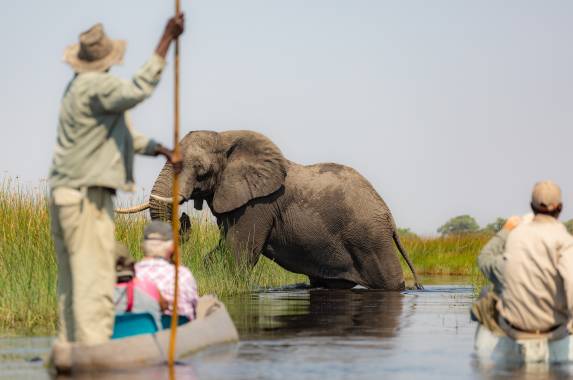
The Okavango River, after travelling 995mi (1,600km) from the highlands of Angola, reaches the Kalahari and spreads into a large swamp where the water transpires into the plant life and evaporates, never reaching the sea. This makes the Okavango Delta, as this swamp is known, one of the largest inland deltas on Earth and a true natural wonder. The delta islands are home to a vast array of wildlife, including all the usual suspects, though numbers reach their peak during the dryer winter months when animals, including many of the larger ones, migrate here.
We head into the delta in mokoro dugout canoes poled by local villagers who have grown up here. Camping with our local guides, we learn more about their lifestyle and culture; in the evening of Day 5, we’re also treated to traditional music and dance of the BaYei and Hambukushu ethnic groups, an unforgettable chance to learn more about their culture.
The camp will be put up by the polers and we use canvas dome tents with camp stretchers, mattresses, sleeping bags and pillows provided. There is also a gazebo for shade, which doubles as a mess tent. Please note, you only need to take luggage for two nights – bags will be provided.
In the delta, we get to experience African wilderness at its fullest, not least at night when the Milky Way can be seen across the sky with a billion twinkling stars.
We spend the next two days exploring the waterways and islands by mokoro canoe and on foot looking for wildlife and enjoying this amazing part of Africa.
Accommodation: Wild camping
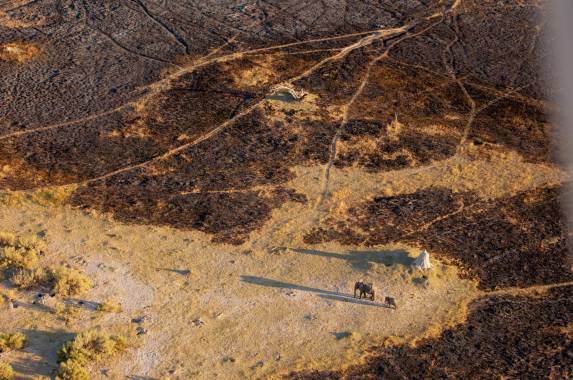
This morning, we have our last mokoro ride as we return to the edge of the delta before returning to Maun. The afternoon is free to relax by the pool or take an optional flight over the delta.
Accommodation: Crocodile Camp (or similar)
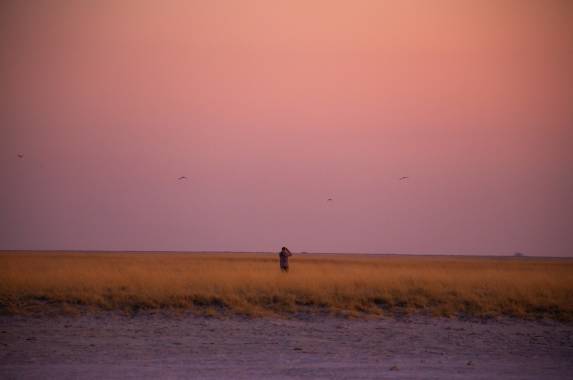
After a brief stop in Maun to resupply, we transfer 185mi (300km) to Nata, arriving mid-afternoon. Later, we gather together, either at the Makgadikgadi Salt Pan or Elephant Sands water hole, to enjoy an unforgettable sundowner together.
Accommodation: Nata Lodge/Elephant Sands Lodge (or similar)
Today we continue our journey back to Zimbabwe. We go via Francistown and Bulawayo on our way to Matobo National Park. The journey is about 235mi (380km) and driving time shouldn’t be much more than about five hours; however, the border crossing can be busy and may take between two and three hours. We stay in chalets just outside the park and can enjoy sundowners from the granite ridge overlooking the park.
Accommodation: Hermits Peak Lodge (or similar)
Matobo National Park, also known as Matopos National Park, is an area known for wildlife and kopjes (giant boulders that seem to be stacked precariously). The park is one of the best places to see both black and white rhinos and has a very dense population of leopards (though these predators are still elusive). It is also home to a third of all eagle species.
These hills were once populated by the indigenous San people, who have left their mark with rock paintings depicting giraffes, elands and kudu. It was also the colonialist Cecil Rhodes’ favourite place and where he asked to be buried.
We enter Matobo National Park early in the morning and go on a game drive followed by a game walk where we hope to see rhino. We visit World’s End, where Cecil Rhodes is buried, and see some of the granite formations and rock paintings. We spend most of the day inside the park returning to the lodge in the afternoon.
Accommodation: Hermits Peak Lodge (or similar)
After a breakfast we make a quick stop in Bulawayo this morning to resupply before driving 210mi (335km) north to Hwange National Park.
The largest national park in Zimbabwe, Hwange covers 5,640sqmi (14,600sqkm) of mopane and teak woodlands and grasslands. It is home to more than 100 mammal species and 400 bird species including all of the specially protected animals in the country. The most famous inhabitants are the elephants and wild dogs, and it is the only place where gemsbok and brown hyena live in reasonable numbers in Zimbabwe.
We stay in a property within a game-management area that neighbours the park.
Accommodation: Hwange Safari Lodge (or similar)
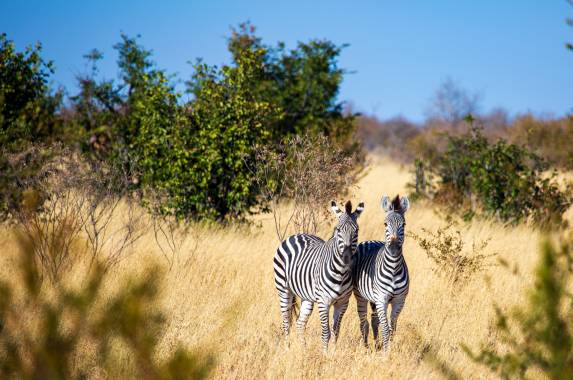
We spend all day on a 4×4 open game drive in search of Hwange wildlife.
Accommodation: Hwange Safari Lodge (or similar)
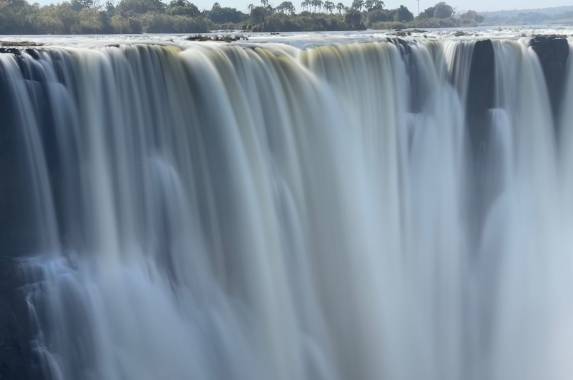
After a slightly later start to the day, we take a short, final drive back to Victoria Falls, arriving at Victoria Falls town around lunchtime. In the afternoon, we head out towards the mighty falls themselves.
Measuring 5,580ft (1,700m) wide and 330ft (100m) high, Victoria Falls is the largest waterfall in the world. The volume of water changes with the seasons but, when full, the spray rises into the sky – a phenomenon that has given the falls their local name Mosi o Tunya, the Smoke that Thunders. They are a site to behold and one that impressed Dr David Livingstone so much that he said: ‘Scenes so lovely must have been gazed upon by angels in their flight.’
Accommodation: The Rainbow Hotel (or similar)
Today is a free day to enjoy the many activities on offer here, such as white-water rafting, taking a flight over the falls, going on a sunset cruise or crossing into neighbouring Zambia to see the falls from another perspective.
Accommodation: The Rainbow Hotel (or similar)
You’ve explored the Okavango Delta by mokoro, spotted iconic safari animals and camped under the African sky, but now our adventure comes to an end.
Alternatively, if you’d like more time to experience the wonder that is Victoria Falls, speak to your sales representative about extending your stay.
Accommodation
Lodges, hotel and wild camping

We aim to secure locally owned accommodation that is well located, offers good value for money, and plenty of comfort. To help you find your ideal adventure, each trip is given a Comfort Level rating, which indicates the overall standard of accommodation. For more on our ratings, see our Comfort Level guidelines.
For this trip, we spend nine nights in lodges, two nights in a hotel and two nights of full-service camping. The normal accommodation used is on the day-to-day itinerary.
Wild camping in the Okavango Delta
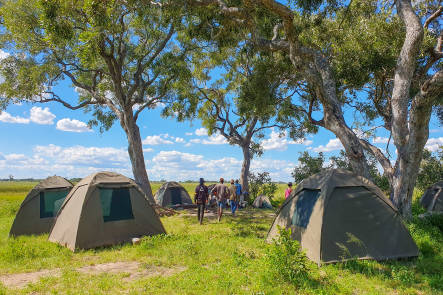
The highlight stay on this trip for many, however, is our two nights of wild camping in the Okavango Delta. Our neighbours, which you’ll likely hear shuffling around at night, include hippos, elephants and lions, while our away-from-it-all location normally allows us to see a night sky illuminated with stars. To make things easier, our camp is set up for us and all equipment is provided. We sleep in spacious, two-person tents fitted with mattress-topped camp beds and there is a bush shower and toilet, while dinner is taken around our atmospheric campfire.
Worth knowing
- Tailor your trip: Extend your adventure by securing extra hotel nights before or after the main itinerary. Speak to your sales representative to book.
- Private rooms: Like most tour operators, we room solo passengers together. If you’d prefer to have a private room, it’s normally possible to do this for a supplement. Speak to your sales representative to book.
- Facilities: Most properties have swimming pools and wifi (although this can be unreliable).
- Day 7: Our accommodation on Day 7 is either at Nata Lodge or Elephant Sands Lodge. Nata Lodge is a permanent tented camp, offering comfortable rooms, in part made of canvas, with private bathrooms – a quintessential African safari experience.
Single supplement from £ 755
Food & Drink
We stay in lodges most nights, but meals are prepared by our crew.
- Breakfast is generally cereal or toast with tea and coffee with the occasional fried breakfast/brunch
- Lunch is normally a simple picnic of cheese, cold meats, salads, bread or rolls
- Dinners are cooked meals such as potjies (stew), braais (barbecues), stir-fries etc
The trip leaders do all the shopping and meal planning for the group. They always try to obtain fresh produce wherever possible. Each tour has one cool box for the meats and the fresh produce only and one cool box for cold drinks. We supply the following drinks: squash, tea or coffee served with meals. All other beverages will be at your own expense. We do not supply bottled drinking water although it is available at many shops on tour if you want to buy it yourself. On some days where early morning game drives are included, lunch may be substituted for a large brunch on return from the game drive – this is customary. We ensure the number of meals detailed in the Trip Notes are provided.
Please note, we need at least two weeks’ notice to deal with special dietary requirements (eg vegetarian or allergies.) For this reason, if you did not indicate these on your booking form, please advise us as soon as possible.
The water provided on this trip is safe and clean drinking water, normally from boreholes. It is not bottled water, however. If you would rather have bottled water then this will be at your expense, though we encourage you to make use of the safe drinking water provided as this helps diminish plastic consumption.
Transport
When driving between the parks we use a minibus, normally a Mercedes Sprinter or similar. On game drives, we use 4×4 safari vehicles, generally Toyota Landcruisers. We enter the Okavango Delta by mokoro canoes, a dugout canoe low in the water and poled by one of the expert local polers.
Weather & Seasonality
There is no best time to go in terms of game viewing or conditions in the Delta, as the Delta flows year-round, despite its flood periods. The wettest season is January and February, when travel on dirt roads becomes difficult. March to September, although dry and bright, can be cold at night (in June and July it really can be chilly on occasions so bring appropriate gear). Water levels in the Delta will be at their highest in July. From December to June, water levels in the Zambezi are at their highest, and the spray can be seen several miles away as it soars sometimes as much as 152m (500ft) in the air. October and November are the hottest months, and midday temperatures can be very uncomfortable. The rains normally start slowly in late November. December can be wet, but it does not rain for long periods and should definitely not put anyone off travelling, as there is always plenty of sunshine.
Joining Instructions
Key information
Joining point: Clients can join this tour either at the airport (see below) or the Rainbow Hotel, 278 Park Way, Victoria Falls, Zimbabwe
Recommended arrival time if joining at the Rainbow Hotel: Before 1pm to catch the transfer to Kasane in Botswana. There will be a welcome briefing around 6pm on the first evening of the trip.
Getting to the start point
Exodus provides one group transfer from the airport, which then goes to the Rainbow Hotel in Victoria Falls (on the Zimbabwean side) to pick up clients meeting there. The group will then travel to Kasane, Botswana, so it is essential all clients catch this transfer, either at the airport or the Rainbow Hotel.
This transfer is normally from Victoria Falls Airport (also on the Zimbabwean side). However, some departures may have the group transfer departing from Livingstone Airport (on the Zambian side).
You may join this transfer at no extra cost, provided you can be at the correct airport before the transfer leaves. Speak to your sales representative for the group transfer times or to arrange a private transfer.
If you would like further information on joining this trip, please speak to your sales representative.
Catching your return flight
There’s a group departure transfer to the airport for those booked onto a chosen flight. Please speak to your sales representative if you wish to join. If the group departure transfer does not suit your flight time, speak to your sales representative to arrange an alternative transfer.
Full joining instructions including local emergency numbers will be sent to you as part of our Final Joining Instructions. If you do not receive these at least a week before departure, or require them earlier please contact our office or your travel agent.
Location start: Victoria Falls
Location end: Victoria Falls
What To Take
Essential Equipment
In addition to your ‘normal’ daily clothes:
- Neutral-coloured clothes (for the game walks)
- Long-sleeved clothing and long trousers (pants) to wear when the sun goes down to protect skin from mosquito bites
- Some warmer clothes, windproof jacket and warm fleece for winter
- Lightweight walking boots or trainers
- Sunhat
- Sunscreen
- Sunglasses
- Buff/scarf
- Insect repellent
- Daypack
- Emergency toilet paper
- Wet wipes or hand sanitiser gel
- Towel
- Head torch (headlamp) with spare batteries
- Water bottle
Water included: Plastic bottles are a big issue in many countries where recycling isn’t yet widely available; they often end up in landfill or get burned. Both processes are harmful to the environment and we would like to reduce our impact here. For your trip, we provide an alternative to single-use plastic bottles to reduce the plastic used. This means that safe drinking water will be available throughout; all you need to do is bring a bottle to refill along the way. Please add this to your packing list.
Optional Equipment
- Binoculars and a camera with a zoom lens (at least 300mm) if you want good animal shots
- Waterproof bags (to protect valuables on the mokoros)
Spare space? If you have room in your luggage, consider bringing items to donate to schools and villages − your tour leader can assist in delivering them once you’ve arrived.
Much-need items included:
- School stationery, including pens, pencils, crayons, erasers, rulers and notebooks
- Card games
- Balls, including (deflated!) footballs and tennis balls
- Toiletries, including toothpaste, toothbrushes and soap
Practical Information
Visa
Botswana
Currently British and Commonwealth and European passport holders do not require visas for Botswana.
If you are transiting through South Africa and are a non UK passport holder you may require a transit visa. Please check before travelling.
Please be aware that children under the age of 18 must provide a full birth certificate (a short one won’t be accepted) as well as a valid passport. If the child is travelling with only one parent or with another adult, the missing parent (or parents) will have to provide an affidavit giving their consent for the child to travel. If flying via S. Africa you may have to pass immigration between flights and the same regulation is needed for entry into S. Africa.
Zimbabwe
Most nationalities, including British require a visa to visit Zimbabwe. This can be obtained on arrival in Zimbabwe. The current charge for a single entry visit visa issued on arrival in Zimbabwe is US$55.00, although this could change. If you have not obtained a visa before travelling, you should bring enough cash with you to pay for your visa on arrival. You should ensure you have small notes as immigration officers may not be able to provide change.
For this itinerary we recommend the double entry visa for Zimbabwe (US$70.00) which is available to UK passport holders and some other nationalities.
Please note that if flying via South Africa you will probably have to pass immigration there. New regulations, as of the 1 Oct 2014, mean that children under 18 will have to have an unabridged birth certificate showing the names of both parents. If the child is travelling with only one parent they will need to have an affidavit from the other parent, of no more than 3 months, confirming the child can travel with the other parent; a court order granting full legal guardianship of the child; or a death certificate of the deceased parent.
Vaccinations and Health
Botswana
There are no required vaccinations. However, you may want to consider vaccinations for hepatitis A, polio, tetanus, typhoid, cholera, hepatitis B, rabies and tuberculosis. You will also need a yellow fever vaccination certificate if you have travelled from (or transited through) a country with risk of yellow fever transmission. Please confirm with your doctor or travel clinic. We also suggest you seek advice from your doctor or travel clinic about which malaria tablets to take.
Zimbabwe
There are no required vaccinations. However, you may want to consider vaccinations for hepatitis A, tetanus, typhoid, cholera, hepatitis B, rabies and tuberculosis. You will also need a yellow fever vaccination certificate if you’re arriving from a country with risk of yellow fever transmission or transiting for more than 12 hours through a country with risk of yellow fever transmission. Malaria is also a known risk. Please seek advice from your doctor or travel clinic on the best course of action for all the above.
Malaria prophylaxis is essential on this trip, and we suggest that you seek advice from your GP or travel health clinic about which malaria tablets to take.
Bilharzia is known to occur in some of the lakes or rivers visited on this itinerary, we therefore advise all to take advice from your guide or leader locally before venturing for a swim.
Local Time
Botswana's time zone: Africa/Gaborone (UTC +02:00)
Zimbabwe's time zone: Africa/Harare (UTC +02:00)
Electricity
Botswana’s electricity: Plug types M (three round pins) and G (three rectangular pins) – 230V, 50Hz
Zimbabwe’s electricity: Plug types M (three round pins) and G (three rectangular pins) – 240V, 50Hz
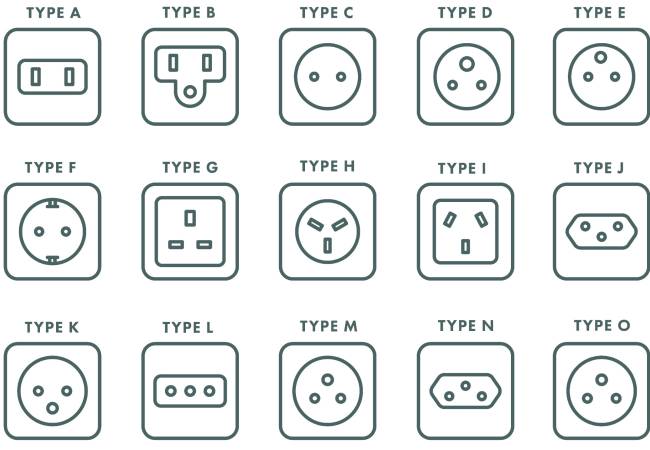
Money
Botswana's currency: Botswana pula (BWP)
Zimbabwe's currency: Zimbabwe gold (ZiG), though US dollars are primarily what is needed in Victoria Falls. South African rand is also accepted to a lesser extent.
ATM Availability
There are ATMs in Victoria Falls and Bulawayo in Zimbabwe, and in Maun and Kasane in Botswana but you should not rely on these for all your money. Credit cards are accepted in hotels, restaurants and for all optional activities in Victoria Falls and Maun; however, in more informal establishments, card payments are not possible.
All major denominations, including but not limited to, Pound Sterling (GBP), US dollars (USD) and Euros (EUR), are accepted at currency exchange establishments, available in all major towns and at the airport. If you prefer to exchange money before your arrival, it is recommended to buy US dollars (post 2017) and include having smaller denominations for spending in Zimbabwe and for tipping purposes.
Extra Expenses & Spending Money
- Meals not included: Allow the equivalent of US$15 per person for an evening meal
- Incidentals: Allow about US$7‐$10 per day
There are several optional activities along the way, including white-water rafting, boat rides and and scenic flights but there’s plenty to occupy you if you don’t participate. These activities can be paid in local currency, card or US dollars in Botswana and card or US dollars in Zimbabwe. Please note that a five percent surcharge may be charged by some operators if paying by card.
Optional excursions (approximate costs, depending on group sizes and prices are subject to change)
Okavango Delta:
- Helicopter flight over the Delta: US$175-US$520 per person depending on passenger numbers (maximum of three people per flight)
Victoria Falls:
- Helicopter flight over falls (12 minutes to 13 minutes): US$150 plus park fees of US$12
- Game/scenic flight (25 minutes): US$284 plus US$12 park fees
- White-water rafting (half day): US$154 plus US$12 park fees
- Sunset Zambezi cruise: US$50 plus US$12 park fees
- Sunset Zambezi cruise and dinner: US$90 plus park fees of US$10
- Night game drive in Hwange (2 hours in an open-air vehicle): US$60
Further activities are available in Victoria Falls but have not been risk assessed by Exodus.
Tipping
Our local staff are paid fairly for their work; however, tipping is part of the culture in Africa. For suggestions on how much to tip, we recommend:
- Tour leader: US$5 per person per day
- Drivers: US$3 per person per day
- Safari/boat guides: US$3 per person per day
- National park guides: US$5 per person per day
- Polers in the Okavango Delta: 200 pula (US$15) per person
- Restaurants: 10% of the bill
Tipping is voluntary and can be declined if service was unsatisfactory.
Sustainability and Impact
As a certified B Corp, we’re on a mission to improve our social and environmental impact across all our adventures.
We do this through our innovative Thriving Nature, Thriving People plan.
This ‘nature positive’ approach is designed to help nature and communities thrive in harmony through practical solutions, such as reducing carbon and waste on our trips, supporting conservation projects through the Exodus Adventure Travels Foundation, and rewilding 100 square metres for every Exodus traveller.
You’ll also find Thriving Nature, Thriving People moments across our trips. These experiences are often a highlight of your adventure, while also benefiting the natural world or local communities.
On this trip, we:
- Explore the Okavango Delta in mokoro canoes helmed by local guides from the community-based Poler’s Trust, who will share their traditional lifestyle and culture with us.
- Participate in BaYei and Hambukushu music and dance to learn more about the traditional culture of these two peoples.
In addition, we support the conservation of African elephants through our Foundation’s Free to Roam Project.
Important Information
Optional activities and excursions
If you would like to join an optional activity or excursion outside those listed in the itinerary, your leader may be able to assist with selecting a provider. However, Exodus has not assessed the safety standards of activities or excursions that are not listed in the Trip Notes. All optional activities or excursions are undertaken at your own risk.
Important Information
Your Safe Participation
When booking this trip, you should be confident in your ability to participate in all activities described in these Trip Notes. If you have any doubt about your suitability, please call us and ask to speak to one of the experts on this itinerary.
Although our leaders are well trained to deal with different capabilities, if they have any concerns about someone’s ability to safely take part in an activity, or their impact on other people’s enjoyment, we authorise them to take necessary action which, in some circumstances, may involve asking someone to miss that activity.
By booking this trip you agree to our Booking Conditions which clearly state that our leaders have the authority to do this. In these rare instances we will ensure anyone sitting out is safely provided for and offered alternative options where possible. Refunds will not be provided for activities missed and customers may be liable for additional costs incurred.
Seatbelts
All vehicles used by us should be equipped with working seatbelts, except where approved by us based on the vehicle type or journey. Wherever seatbelts are available, we require our customers to use them for their own safety, even where it may not be a legal requirement.
Travel Safety
For additional information please have a look at the travel safety advice page on our website.
How to Book
Speak to our friendly team of experts to plan your adventure:
- Check availability: our website shows real-time availability of our guided group tours, or contact our team by phone, email or live chat.
- Hold a space: You can provisionally hold a space on any guided group tour to give you time to finalise your travel plans.
- Confirm your booking: Payment of a deposit will complete your booking and secure your place on the trip.
After booking
You will receive a confirmation document and invoice, which includes extra information and guidance about your travel arrangements. Our dedicated Customer Operations team will help you with any pre-travel questions or arrangements and can easily add extensions or extra accommodation to your booking. Final Joining Instructions will usually be sent out two to three weeks prior to departure.
Adding transfers to your booking
If you have arranged your own flights and would like to add transfers to your booking, please provide your arrival and departure details to our Customer Operations team around four to six weeks before departure.
- Where free transfers are included, they are available for any flight but can only be added to your booking once we have received your flight schedule.
- Where group arrival and departure transfers are available, these operate at fixed times. You will need to arrive in time to meet the scheduled transfer. If the timings don’t align with your travel plans, our team can arrange private transfers once they receive your flight schedule.
Trip Note validity
Trip notes may be updated after booking; if any updates significantly impact the inclusions or itinerary you will be advised in writing. A link to the most up-to-date Trip Notes will be sent out with your Final Joining Instructions before departure.
The information in these Trip Notes is given in good faith. All holidays can be subject to unexpected changes, and occasionally it may not be possible to follow the itinerary as planned. In these circumstances we will make the best-possible alternative arrangements that maintain the integrity of the original itinerary.

